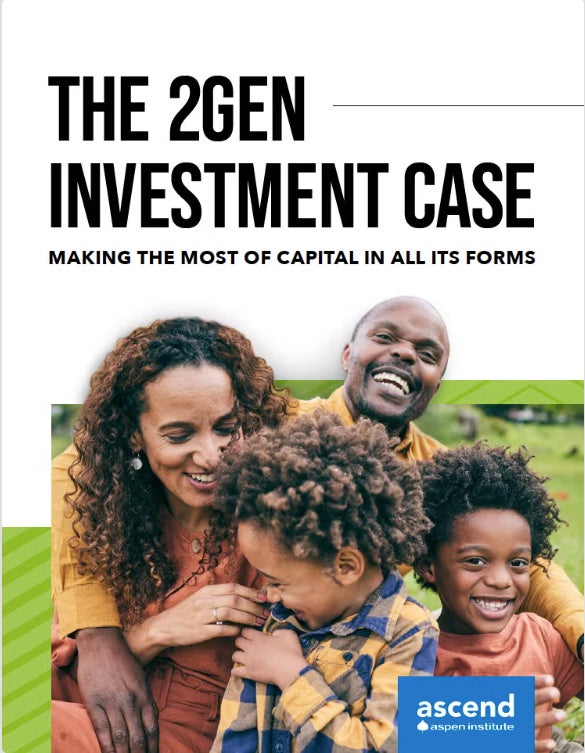Ascend: Unlock change capital to fast-track ambitious solutions for families – The Aspen Institute


Leaders dedicated to supporting families are regularly showcasing their incredible creativity and agility in finding solutions to our most pressing challenges. In a world where federal systems are rapidly reshaping funding priorities, organizations are adapting to sustain vital services, drive critical research, or launch bold, innovative programs. This demands not just flexibility, but a mindset of resilience and growth that can turn uncertainty into opportunity.
Enter “change capital.”
In 2025, we need a new approach to funding to achieve sustainable impact. Traditional funding models that only look at financial capital often struggle to scale and create systemic change. At Ascend, we’re holistically focusing on the four components of change capital – talent, intellectual, social, and financial – to drive lasting, transformative change.
How Change Capital Drives Success
When talent, intellectual, social, and financial capital align, they form a powerful engine of change. In our 2Gen Investment Case: Making the Most of Capital in All Its Forms report launching next month, Ascend at the Aspen Institute demonstrates this principle in action: change capital unlocked over half a billion dollars for the two-generation (2Gen) approach, which intentionally works towards family health and economic well-being by simultaneously focusing on children and the adults in their life together.
Here is the full power of change capital in action: In January 2021, the W.K. Kellogg Foundation along with the Doris Duke Foundation and local funders supported the American Public Human Services Association (APHSA) and the Administration on Children and Families (ACF) to launch the Advancing Family Economic Mobility (AFEM) Initiative, with backing from the Doris Duke Foundation and local funders. AFEM was able to have outsize impact when creating lasting pathways to economic mobility by putting funding (financial capital) towards leveraging these relationships (social capital) to build better workforce development and job quality (talent capital), and share learnings (intellectual capital). In Mississippi, for example, two key groups attached to AFEM — the Statewide Action Learning Network and Workforce HUB — drove bold, family-focused policies and strategies. As a result, they created a clear roadmap for systems change, stronger workforce development, and improved job quality that ultimately supported the financial well-being of whole families.
Defining Change Capital: The Building Blocks
Talent Capital
Talent capital is centered on the talented leaders driving change. It is not enough to fund a program and hope for the best; we must both build on the skills of leaders and elevate the lived experiences and abilities of those directly impacted by the issues as co-creators. Practitioners and funders, policymakers and community leaders, families and caregivers must have an active role in program design and decision-making. By involving people as partners and drawing on their skills to shape policies and systems, talent capital ensures that solutions are grounded in lived experiences and real needs.
Intellectual Capital
Intellectual capital is the knowledge we cultivate, use, and share to guide decisions and scale programs. Change capital requires investing in evidence-based approaches, which are flexible enough to adapt as new insights emerge. For example, 2Gen uses data-driven frameworks to measure the well-being of both children and parents, ensuring policies address their evolving needs. Intellectual capital moves beyond isolated pilots and advocates for long-term, system-wide change based on empirical evidence. Our 2Gen Investment Case report and accompanying guide to support collaboration for community-public-private partnerships, the 2Gen Collaborative Toolkit: A Place-Based Approach to Supporting Families, for example, aim to build on our decades’ worth of learnings in change capital to create another decade of innovation for and with families. This year, Ascend will be putting out a blueprint of solutions rooted in insights, results, and models from the Ascend Fellowship and Network to advance policy and systems change for families – representing significant intellectual capital across the country.
Social Capital
Social capital is about expanding and cultivating strong networks and relationships that enable individuals and organizations to collaborate effectively. It’s essential for sustaining momentum and integrating initiatives into a broader ecosystem of support. The 2Gen model connects services for children and parents, fostering collaboration across sectors like education, health, and social services. By investing in social capital, we can create cohesive, community-driven solutions and align resources across different sectors.
Financial Capital
Financial capital fuels innovation and enables initiatives to scale and achieve their full potential. Change capital recognizes that funding must be aligned with mission and invested strategically to create lasting outcomes. This involves securing both flexible funding streams from the outset, ensuring long-term sustainability. Financial capital that is patient supports initiatives at various stages of development, from conceptualization to system-wide change. By building a funding pipeline that supports growth, we can focus on long-term solutions rather than short-term fixes.
A Path Forward
We won’t stop at the $500 million already invested in 2Gen approaches. Ascend will continue to leverage all elements of change capital to strengthen relationships, build skills, share knowledge – and yes, link funding – to better serve families holistically.
The interwoven strands of change capital offer a pragmatic framework for the field to collaborate, grow, and keep families at the center of everything we do. At Ascend, as we work with leaders across direct service, education, philanthropy, policy, and systems, we are driven in our 2Gen approach and wider strategy by the elements within change capital. As we continue to collaborate with our community to focus our goals for 2025 and beyond – and navigate today’s rapid changes – we hope you join us in creating change capital for and with families. Now, more than ever, we need to think beyond the financial and work with a holistic mindset to create lasting social transformation.

Many people use their phones to handle everyday tasks, from scheduling appointments to staying connected with family. Budgeting apps are...

Parent PLUS borrowing will be capped beginning July 1, 2026: up to $20,000 per student per year and $65,000 lifetime...

Advisors affiliated with independent broker/dealers often assume that “independence” is a destination rather than a spectrum. Yet, when frustration creeps...